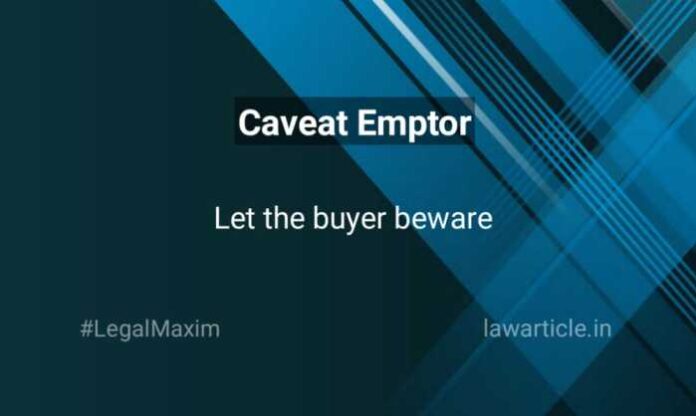CAVEAT EMPTOR
Literal Meaning
Let the buyer beware
Origin
Latin
Explanation
Caveat Emptor is a principle of contract law, that place the onus on the buyer to perform due diligence before making a purchase. In general, it is the principle that often places the burden to reasonably examine the property before purchasing on buyers and take responsibility for its condition. In the commercial transactions, principle that the buyer purchases at his own risk in the absence of an express warranty in the contract.
The doctrine of Caveat Emptor is an important aspect of the Sale of Goods Act 1930, ensuring it puts the purchaser himself in control of their decision. Section 16 of the Sale of Goods Act clearly specifies that there is no implicit guarantee or obligation as to the nature or fitness of the goods sold under such a contract of sale for any particular reason. This means the principle of Caveat Emptor is seeking to make the consumer more aware of his options. It is the buyer’s responsibility to test the product’s price and utility, he is purchasing. If the commodity turned out to be faulty the retailer is not responsible for the same.
Caveat emptor is a fundamental principle in commerce and contractual relationships between a buyer and a seller. A commercial transaction involves two parties i.e. seller and buyer, and it is the duty for both of them to protect their own interests and rights. In simple terms, it means when a person is buying goods, he should examine them thoroughly as the seller is under no obligation to disclose the whole truth about the goods.
However, there are certain exceptions to the Principle of Caveat Emptor, which include:
- Under Section 16(1) of the Sale of Goods Act, when the seller either expressly or by implication is aware of the purpose for which a buyer requires the goods, the supplier has a duty to provide the customer the goods in accordance with the purpose of his purchase.
- Under Section 16(2) of Sale of Goods Act, a dealer who is not a manufacturer of goods has a duty to deliver the goods of merchantable quality, which means that the goods must be capable of passing in the market in the name or description by which they are sold.
- Under Section 16(3) of the Sale of Goods Act, when a seller is aware of the usage of trade i.e. the purpose for which the goods will be used, then there is an implied condition that seller must warrant the quality or fitness of the goods.
Illustration
A wants to buy a car from B. In this case A is responsible for gathering the necessary information to make an informed purchase. If he simply buys the car by just asking price and makes little or no effort to assess its true value, and the car subsequently breaks down, B is not liable for damages under the principle of caveat emptor.
A buys a bicycle from B by mentioning that he wants to use the cycle for mountain trekking. In this case, if B sells him an ordinary bicycle that is incapable of fulfilling A’s purpose the seller ‘B’ will be responsible.
Case Laws
Peter Darlington Partners Ltd vs. Gosh Co. Ltd,
There was a contract for the sale of canary seed and it was held that the contract was subject to the customs of the trade and the buyer shall receive a rebate on the price for impurities in the seed but the goods cannot be rejected. However, any unreasonable custom of trade does not affect a contract between the parties.
Ranbirsingh Shankar Singh Thakur vs. Hindustan General Electric Corporation Ltd
It was held that Section 16(1) applies where the buyer requires goods for a specific purpose and he expressly or impliedly makes that purpose known to the seller, he relies on the skills of the seller and the seller’s usual course of business is to sell such goods whether he is the actual producer or not.
Also Read: Animus Nocendi Conditions for the issue of Writ of Mandamus




